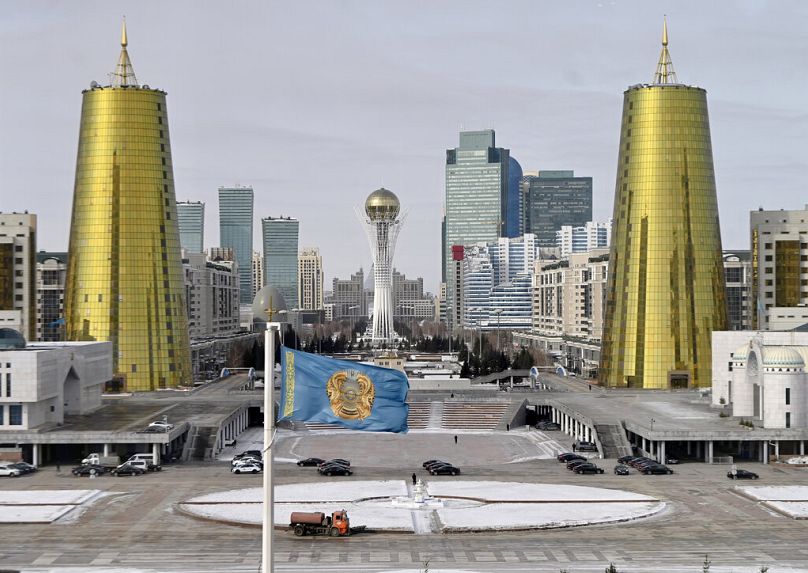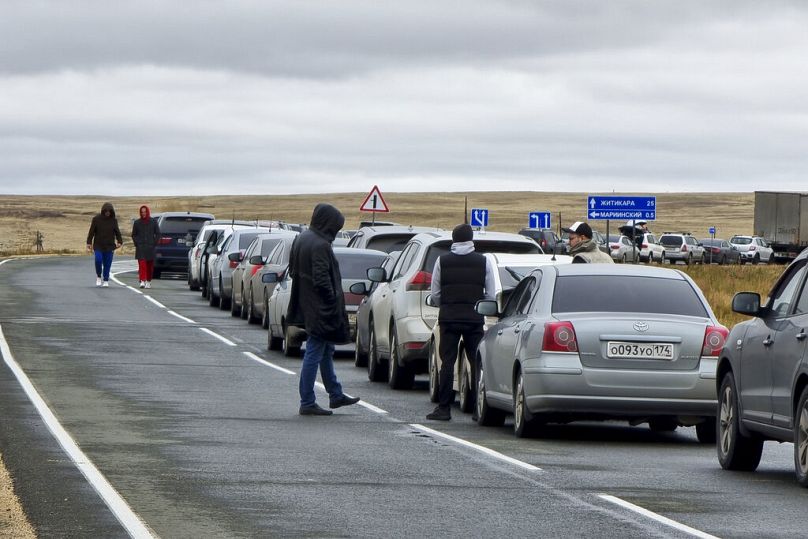Times are hard. War in Ukraine, climate change, the prolonged impact of COVID, plus a multitude of other local and international factors have battered economies around the world.
But not everywhere.
Those in Central Asia saw breakneck growth during the first half of 2023, according to the European Bank for Reconstruction and Development’s (EBRD) latest report.
Tajikistan leads the pack with GDP growth of 7.5% expected this year, followed by Uzbekistan (6.5%), Kazakhstan (5%) and Kyrgyzstan (4.6%).
Many elements are at play, including China’s reopening after the pandemic, yet Dr Anna Matveeva of King’s College’s Russia Insitute points to a “very obvious one”: Moscow’s invasion of Ukraine.
This led “citizens of Russia [and] Belarus… to relocate their money and businesses to Central Asia” in a bid to avoid Western sanctions, she tells Euronews, adding they have driven up “consumption” and “demand for sophisticated services”.
Russian companies have moved to Kazakhstan and Kyrgyzstan especially, with their geographic proximity and “cultural closeness” making the process much easier, Matveeva adds.
She also points to the pair’s membership in the Eurasian Economic Union with Russia, Belarus and Armenia which facilitates economic integration through common markets, harmonised regulation and free trade zones.
“People’s preferred choice is, certainly, to go to Western Europe or the United States. But being in Central Asia has some advantages. One is people can come and go – they do not necessarily have to make a decision to emigrate permanently.”
Precise figures are hard to come by, but hundreds of thousands of Russians are thought to have fled the country since war broke out in February 2022.
Many have since returned, unable to find work or secure residency status, however.
Yet there are other parts to Central Asia’s success story.
The migration of workers from the region to Russia has also boosted economic growth as they send money back to their countries of origin, according to the EBRD’s September report.
It added this flow of money “notably compensates for the exodus of the working-age population” in Central Asia, with millions tending to work in low-paid sectors of Russia’s economy, such as construction, farming and hospitality.
Still, this lightening growth is not blemish-free.
Accusations have grown among experts that Central Asia countries are helping Russia dodge sanctions imposed by the West over its invasion of Ukraine.
Speaking to Euronews in August, Tom Keatinge explained how sanctioned Western products and commodities were being imported into third countries, such as Kazakhstan and India, and then re-exported to Russia.
“It doesn’t make a mockery of the sanctions, but it certainly makes it far more difficult to ensure the restrictions are being properly imposed,” he said.
Data from Bruegel, an independent European think-tank, shows imports of sanctioned Western goods to Kazasktan increased massively after Russia’s February invasion.
These restricted items include electric machinery and parts, instruments and apparatus and transport equipment.
Between January and October 2022, Kazakh companies exported electronics and mobile phones to Russia for over €549m, 18 times more than that in the same period of 2021, as per data from the Central Asian Bureau for Analytical Reporting.
Such trade is far from new, however. It can be traced back to routes that emerged during the Cold War era when Russia – then the USSR – was similarly embargoed.
Plus Matveeva explains Moscow has “other ways of working around the sanctions”, with “many countries around the world involved, including those in Europe.”
“Sanctions are generally seen as quite ineffective and quite pointless [in Central Asia],” she says. “It doesn’t mean everybody likes what Russia is doing in Ukraine. But the Western response is not seen as appropriate.”
While the economic impact of the fallout from the Ukraine war has been largely positive on the region, the academic points to “things central Asians are not quite happy with”.
“Conscious of the big picture,” she notes sanctions have impacted Central Asia’s ability to export and transport goods, with most routes involving Russian territory.
Kazakhstan in particular is worried about possible Ukrainian drone attacks on the Caspian Pipeline Consortium terminal at the Black Sea, which could potentially disrupt its oil exports.
“The West in its quest to hurt Russia needs to think what it means for others who do not really have that many other options. Western pressure does create an alienating effect and more anti-Western sentiment where there has been really none,” she concludes.



























